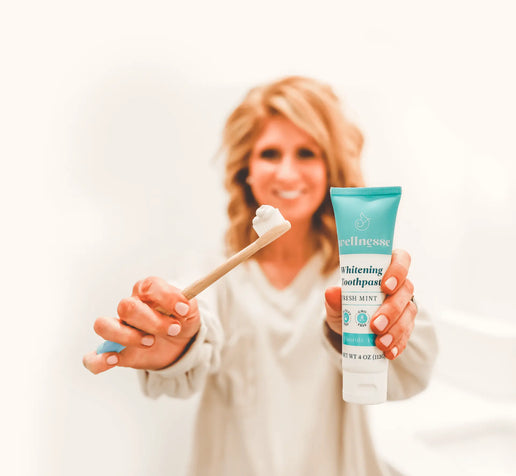In the quest for better health, every choice matters. This includes the toothpaste we use daily.
Wellness toothpaste is gaining popularity. But what exactly is it?
It’s a type of toothpaste that focuses on overall oral health. It often includes natural and herbal ingredients.
This article will explore the benefits of wellness toothpaste. We’ll delve into its unique features and how it compares to traditional options.
Whether you’re a health-conscious individual or just curious, this article is for you.
Join us as we uncover the world of wellness toothpaste.

What is Wellness Toothpaste?
Wellness toothpaste is a unique oral care product. It’s designed with a focus on overall oral health.
Unlike conventional toothpaste, it often contains natural and herbal ingredients. These ingredients are chosen for their specific health benefits.
Wellness toothpaste aims to support a healthy oral microbiome. It does this by avoiding harmful chemicals often found in traditional toothpaste.
In essence, wellness toothpaste is about more than just cleaning your teeth. It’s about promoting a healthier mouth and body.
Key Ingredients in Wellness Toothpaste
Wellness toothpaste is packed with beneficial ingredients. These are often derived from nature.
Common ingredients include aloe vera, neem, and eucalyptus. These herbal extracts are known for their health benefits.
Aloe vera, for instance, has soothing properties. It can help reduce inflammation in the gums.
Neem, on the other hand, has antibacterial properties. It can help prevent plaque buildup and gum disease.
Eucalyptus is often used for its refreshing flavor. It also has antimicrobial properties that can help maintain oral health.
Here are some other common ingredients found in wellness toothpaste:
- Essential oils for their antiseptic and antibacterial properties
- Minerals like calcium and phosphorus for tooth strength
- Vitamins and other nutrients for overall oral health
““
The Absence of Harmful Chemicals
One of the key benefits of wellness toothpaste is its clean ingredient list. Unlike conventional toothpaste, it does not contain harmful chemicals.
Triclosan, SLS, and artificial sweeteners are often found in traditional toothpaste. These can cause irritation and other health issues.
Wellness toothpaste, on the other hand, is free from these harmful substances. This makes it a safer choice for oral care.
By choosing wellness toothpaste, you are not only promoting oral health. You are also reducing your exposure to potentially harmful chemicals.
Oral Wellness and Overall Health
Oral wellness is not just about having a bright smile. It plays a crucial role in our overall health.
Wellness toothpaste supports oral wellness by maintaining a healthy oral environment. This can help prevent oral diseases.
Moreover, oral health is linked to overall health. Conditions like heart disease and diabetes have been linked to oral health issues.
By using wellness toothpaste, you are taking a step towards better overall health. It’s a simple change with potentially significant benefits.
Benefits for Your Oral Microbiome
Our mouths are home to a complex ecosystem of bacteria, known as the oral microbiome. This microbiome plays a key role in oral health.
Wellness toothpaste can support a healthy oral microbiome. It does this by promoting beneficial bacteria and inhibiting harmful ones.
A balanced oral microbiome can help prevent issues like gum disease and bad breath. It can also contribute to overall health.
In short, using wellness toothpaste can be a positive step towards maintaining a healthy oral microbiome.
Herbal Toothpaste and Gum Disease
Gum disease is a common oral health issue. It’s often caused by harmful bacteria in the mouth.
Herbal toothpaste, a type of wellness toothpaste, can help combat this. It often contains natural antibacterial ingredients, like neem and eucalyptus.
These ingredients can help reduce the bacteria that cause gum disease. They can also soothe inflamed gums.
In conclusion, herbal toothpaste can be a natural and effective way to help prevent and manage gum disease.

Wellness Toothpaste and Tooth Enamel
Tooth enamel is the hard, outer layer of our teeth. It’s crucial for protecting our teeth from decay.
Wellness toothpaste can help maintain and strengthen this enamel. Many brands contain natural minerals like calcium and phosphorus.
These minerals can help replenish lost minerals in the enamel. This can help keep the enamel strong and resistant to decay.
In conclusion, using wellness toothpaste can be a great way to help protect and strengthen your tooth enamel.
Environmental and Ethical Considerations
Wellness toothpaste brands often prioritize sustainability. They use eco-friendly packaging and source ingredients responsibly.
““
Many brands also avoid animal testing. They align with ethical practices that resonate with conscious consumers.
In addition, some brands support community health initiatives. They contribute to a healthier planet and society.
In essence, choosing wellness toothpaste can be a step towards a more sustainable and ethical lifestyle.
Choosing the Right Wellness Toothpaste
Choosing the right wellness toothpaste involves several factors. It’s not just about the brand or the price.
Consider the ingredients. Look for natural extracts, essential oils, and minerals that benefit oral health.
Also, consider your specific oral health needs. Some wellness toothpastes target specific issues like sensitivity or dry mouth.
Lastly, consult with a dental professional. They can provide guidance based on your oral health history and needs.

Conclusion: Embracing Oral Wellness
Embracing oral wellness is a step towards overall health. Wellness toothpaste plays a key role in this journey.
It offers numerous benefits, from natural ingredients to ethical considerations. It’s a choice that impacts not just your oral health, but also the environment.
Making the switch may require some research and consultation. But the benefits it brings make it worth the effort.
In the end, choosing wellness toothpaste is a choice for better health, a cleaner environment, and a more sustainable future.






